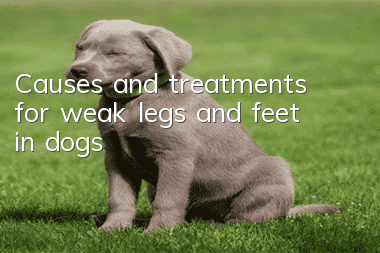Dog intestines should not be underestimated

Causes of gastrointestinal discomfort in dogs:
1. Eating too much. Dogs eating too much will aggravate the digestive work of the dog's gastrointestinal tract, which can easily lead to gastrointestinal indigestion and gastrointestinal discomfort. If a dog eats too much since he was a child, it is likely to damage his intestines and stomach, leading to a glass stomach when he grows up.
2. Food poisoning. Chocolate, coffee, grapes, onions, garlic, fish bones, poultry bones or other animal bones, as well as leftovers high in oil and salt, etc. These things are actually harmful to dogs. Some have immediate effects, while others may Something will happen at some point.
3. Gastrointestinal blockage. If something suddenly disappears from your home and your dog starts to feel uncomfortable in his stomach, it may be that the dog has swallowed it and blocked his stomach.
4. Parasites. Some internal parasites will live in the dog’s intestines and suck nutrients from the body, causing gastrointestinal discomfort in dogs.
5. Gastrointestinal diseases. The general symptoms of any gastrointestinal disease are vomiting, diarrhea, and loss of appetite.
Methods to regulate the gastrointestinal tract:
1. Adjust the food structure. It is recommended that owners purchase high-quality dog food for their dogs. If they need to change dog food, they should gradually increase the amount of new dog food with each meal to allow the dog's stomach to slowly adapt.
2. Correct the feeding method. It is recommended that when feeding dogs, they should eat small meals frequently. If they eat a large amount at one time, or if they are hungry for a long time before feeding, this will be harmful to the dog's body, especially puppies. Incorrect feeding methods will only increase the burden on the dog's gastrointestinal tract.
3. Exercise increases resistance. When a dog's gastrointestinal condition is not good, it can also be improved through exercise. When the dog has good physical strength, its body functions can slowly return to normal.
4. Provide fresh drinking water. Some dogs have poor gastrointestinal problems, which may be caused by not drinking enough water. At this time, the feces will also be too dry and difficult to pass out of the body. Therefore, owners should often provide fresh drinking water to their dogs, not cold water.
5. Doctor’s diagnosis and treatment. Do not give medicine to your dog casually. You must obtain a diagnosis from a veterinarian before giving medicine to your dog. When using medicine, you can add it directly to your dog’s drinking water or food to avoid the trouble of stuffing medicine into your dog’s mouth.
- Can dogs eat fruits and vegetables?
- What causes dogs to poop yellow and loosely?
- What should I do if my dog’s mouth is bitten?
- Will dogs die if they eat crab shells?
- Why is Teddy's eyes red?
- Teddy has diarrhea but is in good spirits
- What to do without the old dog food transition
- What exactly is parvovirus?
- Why do dogs not eat dog food?
- Top 10 Dog IQs. How many of these smart dogs do you have?



